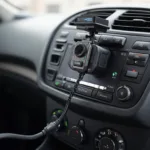A cylinder misfire in your 2007 Ford Explorer V6 4.0 can be a frustrating experience, especially if you’re trying to decipher those cryptic OBD2 codes. Understanding why your 5th cylinder is acting up and knowing how to pinpoint the culprit can save you time, money, and unnecessary headaches.
Decoding the OBD2 Code: P0305
When your check engine light flashes, and your OBD2 scanner throws a P0305 code, it’s signaling a misfire specifically in the 5th cylinder. This means the air-fuel mixture in that cylinder isn’t igniting properly, disrupting your engine’s rhythm.
Common Culprits Behind the Misfire
Several components could be responsible for your 2007 Explorer V6 4.0’s 5th cylinder misfire. Here are the usual suspects:
- Spark Plugs and Ignition Coils: Worn-out spark plugs or faulty ignition coils can fail to provide the spark needed for combustion.
- Fuel Injectors: A clogged or malfunctioning fuel injector can disrupt the fuel supply to the cylinder, leading to a lean air-fuel mixture and misfire.
- Vacuum Leaks: Leaks in the intake manifold or vacuum hoses can disrupt airflow, causing an imbalance in the air-fuel ratio and misfires.
- Compression Issues: Problems with piston rings, valves, or head gaskets can lead to low compression in the cylinder, affecting combustion efficiency.
- Camshaft Position Sensor: This sensor tells the engine computer when to fire the spark plugs. A faulty sensor can disrupt ignition timing and cause misfires.
Diagnosing the Root Cause
Finding the exact cause of the P0305 code requires a systematic approach.
- Visual Inspection: Begin by visually inspecting the spark plugs, ignition coils, and vacuum hoses for any signs of wear, damage, or loose connections.
- Spark Plug and Ignition Coil Check: Test the spark plugs and ignition coils for proper function. A simple swap test, moving the suspected faulty component to a different cylinder and observing if the misfire follows, can be helpful.
- Fuel Injector Inspection: Check the fuel injectors for proper operation. You can use a stethoscope to listen for clicking sounds, indicating they are firing, or have them professionally tested.
- Compression Test: A compression test will reveal any compression loss in the cylinders, helping pinpoint potential mechanical issues.
- Scanning for Additional Codes: Your OBD2 scanner might reveal additional codes that can point to the root cause of the misfire.
Expert Insights
“Many car owners jump to conclusions when they see a misfire code,” says veteran mechanic John Riley. “But remember, it’s crucial to follow a logical diagnostic process. Start with the basics like spark plugs and work your way through the potential culprits.”
Resolving the Misfire
Once you’ve pinpointed the source of the problem, you can address it with the appropriate solution:
- Replacing Worn Components: Replace worn spark plugs, ignition coils, fuel injectors, or vacuum hoses with high-quality replacements.
- Cleaning or Repairing Components: Clean clogged fuel injectors or repair damaged vacuum hoses.
- Addressing Mechanical Issues: Repair or replace damaged piston rings, valves, or head gaskets.
- Sensor Replacement: Replace a faulty camshaft position sensor.
Preventing Future Misfires
Regular maintenance is key to preventing future misfires:
- Timely Spark Plug Replacement: Replace your spark plugs according to your vehicle’s recommended maintenance schedule.
- Regular Fuel System Cleaning: Use a fuel system cleaner regularly to prevent injector clogging.
- Promptly Addressing Engine Issues: Address any engine-related issues, such as rough idling or loss of power, as soon as they arise.
Conclusion
A 5th cylinder misfire in your 2007 Explorer V6 4.0 can be a manageable issue with the right approach. By understanding the common causes, following a structured diagnostic process, and addressing the root cause, you can get your SUV back on the road smoothly. Remember, regular maintenance and prompt attention to any engine concerns can go a long way in preventing future misfires.
